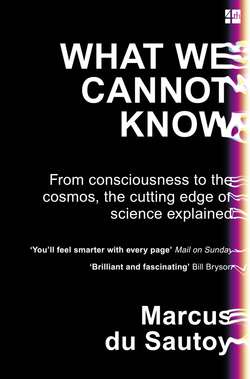Читать книгу What We Cannot Know: Explorations at the Edge of Knowledge - Marcus Sautoy du - Страница 6
EDGE ZERO: The Known Unknowns
ОглавлениеEveryone by nature desires to know.
Aristotle, Metaphysics
Science is king.
Every week, headlines announce new breakthroughs in our understanding of the universe, new technologies that will transform our environment, new medical advances that will extend our lives. Science is giving us unprecedented insights into some of the big questions that have challenged humanity ever since we’ve been able to formulate those questions. Where did we come from? What is the ultimate destiny of the universe? What are the building blocks of the physical world? How does a collection of cells become conscious?
In the last ten years alone we’ve landed a spaceship on a comet, made robots that can create their own language, used stem cells to repair the pancreas of diabetic patients, discovered how to use the power of thought alone to manipulate a robotic arm, sequenced the DNA of a 50,000-year-old cave girl. Science magazines are bursting with the latest breakthroughs emerging from the world’s laboratories. We know so much. The advances of science are extremely intoxicating.
Science has given us our best weapon in our fight against fate. Instead of giving in to the ravages of disease and natural disaster, science has created vaccines to combat deadly viruses like polio and even ebola. Faced with an escalating world population, it is scientific advances that provide the best hope of feeding the 9.6 billion people who are projected to be alive in 2050. It is science that is warning us about the deadly impact we are having on our environment and giving us the chance to do something about it before it is too late. An asteroid might have wiped out the dinosaurs, but the science that humans have developed is our best shield against any future direct hits. In the human race’s constant battle with death, science is its best ally.
Science is king not only when it comes to our fight for survival but also in improving our quality of life. We are able to communicate with friends and family across vast distances. We have unparalleled access to the database of knowledge we have accumulated over generations of investigation. We have created virtual worlds that we can escape to in our leisure time. We can recreate in our living rooms the great performances of Mozart, Miles and Metallica at the press of a button.
That desire to know is programmed into the human psyche. Those early humans with a thirst for knowledge are those who have survived, adapted, transformed their environment. Those not driven by that craving were left behind. Evolution has favoured the mind that wants to know the secrets of how the universe works. The adrenaline rush that accompanies the discovery of new knowledge is nature’s way of telling us that the desire to know is as important as the drive to reproduce. As Aristotle articulated in the opening line of his book Metaphysics, understanding how the world works is a basic human need.
As a schoolkid, science very quickly drew me into its outstretched arms. I fell in love with its extraordinary power to tell us so much about the universe. The fantastic stories that my science teachers told seemed even more fanciful than the fiction I’d been reading at home. As it worked its spell on me I consumed every outlet of science I could get my hands on.
I persuaded my parents to buy me a subscription to New Scientist. I devoured Scientific American in our local library. I hogged the television each week to watch episodes of my favourite science programmes: Horizon and Tomorrow’s World. I was captivated by Jacob Bronowski’s Ascent of Man, Carl Sagan’s Cosmos, Jonathan Miller’s Body in Question. Every Christmas the Royal Institution Christmas Lectures provided a good dollop of science alongside our family turkey. My stocking was stuffed with books by Gamow and Feynman. It was a heady time, with new breakthroughs being announced each week.
Alongside reading these stories of the discovery of things we know, I began to get more fired up by the untold tales. What we knew lay in the past but what we didn’t yet know was the future, my future. I became obsessed with the puzzle books of mathematician Martin Gardner that my maths teacher gave me. The excitement of wrestling with a conundrum and the sudden release of euphoria as I cracked each puzzle got me addicted to the drug of discovery. Those puzzles were my training ground for the greater challenge of tackling questions that didn’t have an answer in the back of the book. It was the unanswered questions, the mathematical mysteries and scientific puzzles that no one had cracked that would become the fuel for my life as a scientist.
